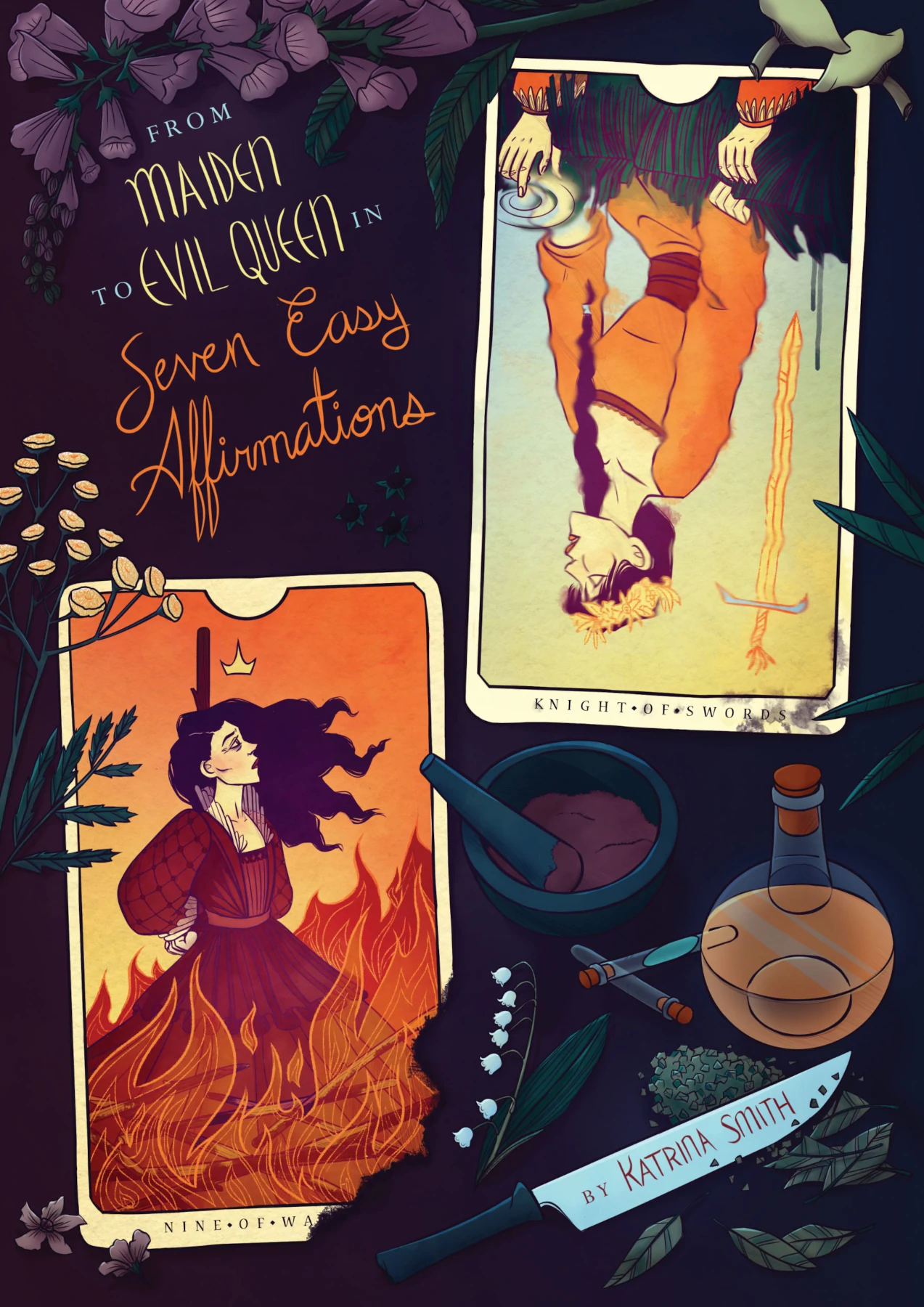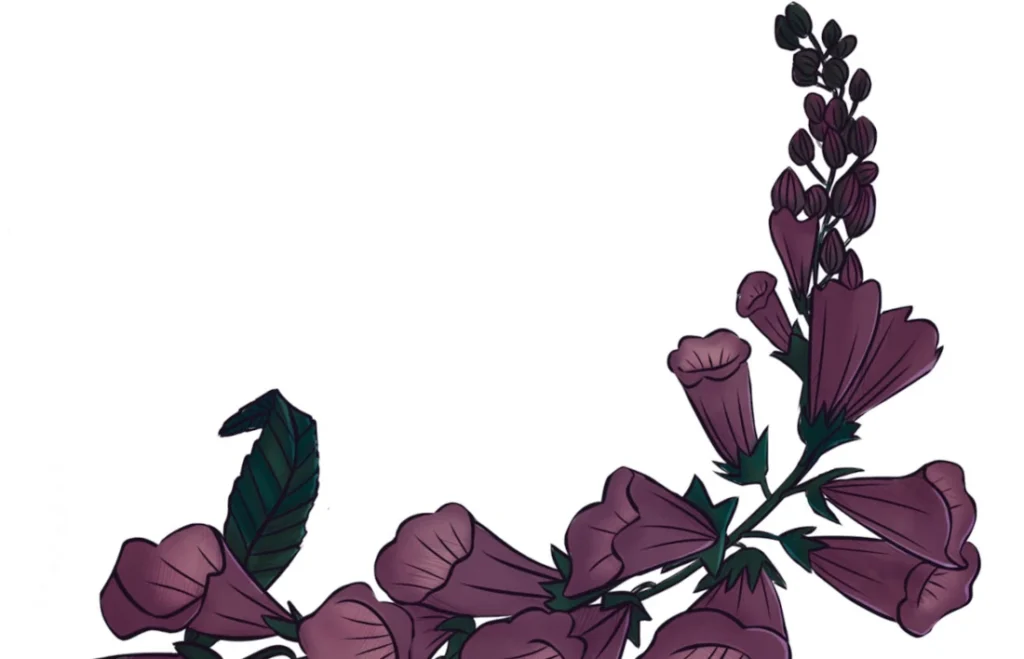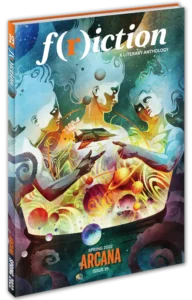
From Maiden to Evil Queen in Seven Easy Affirmations
Words By Katrina Smith, Art By Sam Dow

While out harvesting mushrooms, you meet your reflection in the still pool at the end of a rushing forest stream. All is lanky and restless that spring, a strange energy that lingers underneath the trees like the cough that carried away your mother. It is just you and your father now. He cries at night, the sound scraping against your ribs. He cries because your mother is gone, but also because you are a daughter, not a son, and it is time for you to take a husband, for him to move into your cottage under these leaning pines, for you to produce children who will inherit it someday.
But recklessness roots at the center of you: the cottage, the woods, the husband, the chores, the smooth dirt path your mother’s feet wore into the forest floor, all of this is wrong. This destiny was hers, not your own.
There are rumors, whispers of laughing witches and damned sorceresses, those who cut close to the bone with the iron knife of their own will. Women who work underneath rafters hung with drying herbs, women who speak boldly as they crush and whip and fold and fire, crafting potions to bring on children, to keep them away, to bring husbands, to keep them away.
What if you could be one of them? Power, after all, comes to those who call it.
You lean down, careful to touch the center of your reflection just once, a handful of the right herbs and moss and the small pinion of a crow tossed into still water, and when the ripples smooth, there is a king’s face reflecting above you, raven-haired and arrogant, here to claim you before you can protest.

You are paraded in front of the city for weeks before the wedding, a nameless prize of luminous mystery. No one can believe he stumbled upon such a wonder during a routine hunt, that a pale, frozen beauty awaited him between cold water and stone. You are a prize, a pearl, a peach, almost a queen. You wonder if he remembers your name.
He is dutiful and courteous in public, tender and attentive. This version of him is kind, even loving. But when you are alone, he becomes the breathless cold of the forest stream, the bite of the stinging nettle you dropped into water, the clinical cruelty of a feasting crow.
You cry in front of him once, thinking of your father’s kindness, the freedom of the forest, your mother’s face walking the path, peaceful as she felt for roots and mushrooms with her hands. Little bee, always be sure of what something is before you take it.
You didn’t know what kings were before you’d asked for power, what you were sacrificing before you were poached from the forest.
Harvested, he corrects you. Kings can’t poach what they already own.
There is only one choice left, so you will forge it into a knife’s edge. The day after you become his blushing bride, the envy of all, cut out your own heart and place it in an oaken box lined with velvet. When the king’s bitter desire turns to indifference and indifference to obligation—his love waning with the fall of the first shriveled leaf from the hundred-year oak—your back remains arrow-straight, chin high, your lips as red-slicked and unsmiling as the day he found you. In this way, your young heart, fresh and hopeful, remains always your own.

You know better than to listen to the giddy whispers of the farmer’s wife and the butcher’s daughter; you know every handmaid’s innocence is destined to be stolen, sooner or later, by king or courtier or unsuitable suitor. Choice is an illusion, the light of his charm a flame impossible to resist. You know the light he casts on them is met with an equal darkness—and yet you hate these women anyway. They tremble as they slip one after another through the door to his bedchamber. They drop to curtsy when you meet in drafty hallways, their eyes sliding across the stone floor at your feet, flush with fear.
He will never sire the legitimate bloodline he desires. You feel this as a scratching in your bones, a truth you know the same way you always knew when the mushrooms would come in the fall, when the summer berries would be ripest, when a storm was screaming across the mountain. Without you there is no legacy, no matter what field he harrows. You know best, all along, through every dark winter and every scorching summer, and when he is done with the others and their stomachs swell with regret—your own flat as the day you married—you say nothing. There is nothing that needs to be said.

You were young and beautiful when you were plucked from your forest cottage. Pride keeps you this way. But the nature of your beauty changes: where he once called you living starlight, bewitched by your pale brilliance, you become instead a midnight shadow full of depths he no longer wishes to plumb.
The secret to transformation is gradual. Walk alone through drafty hallways filled with courtiers. They are easy to see through, these pretenders. Your proximity to power is the only part of you they value. You are alone always, but particularly in a room crowded with their insincere, fawning faces. Escape the smoke-choked great hall for battlements high enough to bring you closer to open sky. One night another noblewoman is there. Her dress is finespun and delicate, but she wears it like a burden. Like you, she is here to contemplate the freedom of flight and the reality of landing. She is kind and broken and funny. She hates these people, just like you.
Learn to trust in the slow bloom of genuine friendship, to rely on it, so that when you are walking hand in hand through manicured gardens blooming with the scent of fresh roses, you are finally able to confide the secrets of your darkest heart. Later, you will learn that there are worse feelings than loneliness, as friendship dissolves in the acid of ambition, as you hear those same secrets whispered sneering down the sleeves of court dresses as you pass, as the king you have come to hate enters your bedchamber and throws them back at you.
You freeze for only a moment. These are lies, you tell him, lies told to drive you apart, to keep him from siring his legacy, lies whispered by those jealous of your beauty and devotion to him. Is he, in his incontestable wisdom, capable of a mistake? Of course not. Destiny made sure of that.
You let his fine silks and thick furs slip from your body as you wind your arms around his neck, speak of the cold forest stream and the moment he found you waiting, beg his forgiveness, promise fealty and a strong son and he, so sure of his own divinity, accepts all that you offer as truth and birthright.
You remember this night later, standing on the same rampart. You watch as your former friend is stripped of her title, banished from court and cast out. She seeks out your figure standing high above, and you make yourself as hard and cold as stone, as hard and cold and unreadable as you had made your own heart when he came to do the same to you.
Perception is a kind of power. This is the first of many lessons.
Learn to manipulate it. Control it. Spend your waking hours in front of your mirror, plucking hairs from places they don’t belong, massaging crow’s feet with scented oils distilled from herbs gathered in a meadow not far from the home you are no longer allowed to visit. Vulnerability is a weakness you now know you can ill afford to indulge. Show no one the mirror. Keep it locked away in a secret chamber the servants are forbidden to enter.
It is the only place you may cry.
You never cry.

Mythos crafts itself around you like the black cloak you wear from room to room, from kitchen to king’s bedchamber, carrying the broth you spoon into his ever-weakening mouth. It was a boar that gored him, a festering wound that left him delirious, but the consequence is yours alone to bear. They will say you summoned the boar and led it, breath stinking, through the dark winter forest to deliver the king an untimely fate.
At first there is a small, vicious joy, poisonous as an adder’s bite, at the fear and panic in his fevered eyes. He left on this hunting trip seeking power, secure and arrogant in his ability to wield it. Now he is powerless, and nothing can stop what will follow.
As you watch him waste away, trapped somewhere in the twilight between life and death, you find yourself fitted with a strange benevolence, and not only for the apparent justice that fate has wrought. Once, he was the inescapable power. Once, you were the one trapped. Now, as reality strips the layers of him bare, you find a well of pity you’d thought to leave behind long ago.
Forgiveness can be both a final cruelty and a final act of mercy. There is nothing he would hate more. Your potions could ease the transition, allow him a gentle passage. You do not want him to die like this. You can only say this now that it is clear he will die.
What the others see is something else. The secret room, empty save for the mirror and your oils, becomes a dark laboratory, the forest cottage a witch’s hut capable of raising itself on spindly chicken legs. The way the king’s fever burns him to a final cold stillness underneath your touch is evidence enough for them all.
There is violence in the way their eyes follow your trajectory. Your silence terrifies them. You say nothing and eat less until your bones feel hollow and the angles of your face cut against the air.

Keep the peace. You are Queen, the law yours to make. You, who never wanted squalling brats, find a strange joy in mothering the people. They bow before you now. You are not told where to be or how to dress. Autonomy is yours to savor. There are no more balls, no more useless courtiers. Instead, the people line up at your throne, eyes downcast in supplication.
Mete and measure your impartial judgment in all things. Punish abusers and instigators, dividing their hearths and home acres between long-suffering wives, surviving sons, and spinster daughters. Feed the forgotten, the orphans, and the crones. Power is a slice of citrus in the depths of winter, sharp and sweet on your tongue, and you want to taste nothing else.
Your power grows as the country prospers, but resentment smolders in your wake. The men mutter in taverns and stone halls. They believe you will be struck down by God for corrupting the natural order. In the hallways and stairways of your own castle, voices carry the cadence of treason. Prosperity has bought you only so much time; change moves more slowly than fear and lacks the teeth of hatred. They will come for you. There is so much good you could still do. Fear curdles the orange in your stomach.
What would a king do? A king would have the courage to do what must be done. You are a king now. You must have the courage to do what must be done.
Collect antidotes to every known poison and the poisons themselves and store them in the secret room. Do not flinch when the royal advisors fawn over a succession of his dull-eyed bastard princes. Instead, use the mirror to practice turning to stone.
When the princes begin to die, one by one, no one can read your face.

Progress means nothing when the harvest comes late. Apples shrivel on the branch or else turn with worms. Fanatics shout in the street about divine retribution and a woman’s place. One night they come wielding the pitchforks they have no other use for, their wheat moldering in diseased fields. You are waiting for them in your throne room wearing the trappings of a queen. Led by your own servants, smug old men smash open your secret room to reveal your poisons and break them at your feet, hemlock and snakeroot and nightshade spreading against the stone.
There is one bastard prince left, and it is he who has the honor of lighting your pyre. The ash of your body will consecrate the fields they believe your sin has blighted.
As the torch approaches, swallow your animal fear. You are still a king. Stare, unyielding, at the hard, closed faces that ring you, flickering in the half-light, fear of what you’ve managed to become clear on every face.
Do not feel the fire leaping at your back.
Instead, look up, into a night sky clarified by the breath of late fall. Feel instead the bite of melting snow in spring, moss underneath your feet, a crow’s feather glinting in the new sun. Remember your own young face refracting through water, angry and hopeful, a clutched handful of herbs ready to fall, nothing yet set in motion, a lifetime of king and country still to come.
You will die as you have lived: casting light and shadow throughout this long darkness.

